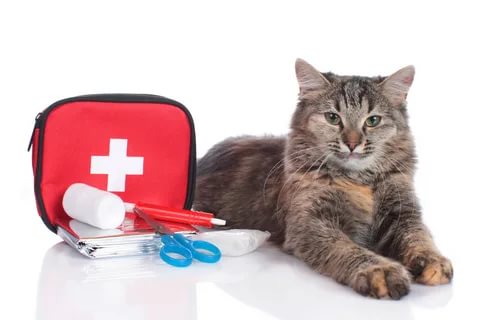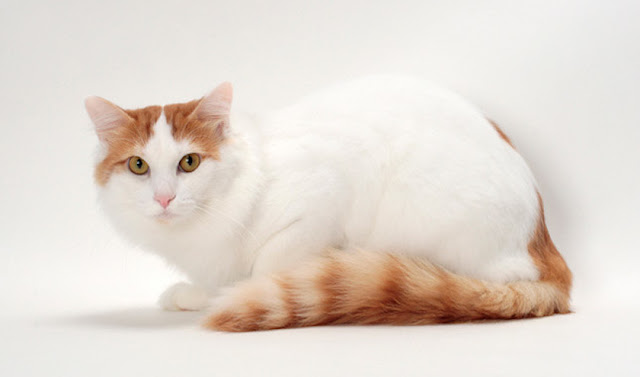A practical translation from Arabic to English for the complete guide — from pregnancy confirmation to postpartum care — divided into time stages, supply lists, daily routines, and emergency tips.
Quick introduction
The gestation period for cats usually lasts from 58 to 67 days.
This guide covers: pregnancy confirmation, stages of pregnancy (weeks 1-3, 4-6, 7-9), preparation for delivery, delivery, and post-delivery care.
Basic necessities (Prepare early)
- Kitten food (wet or dry, high in protein).
- The clean food and water bowls are placed in a quiet and stable location.
- Birth box (cardboard box or basket) with washable blankets.
- Clean cat litter and an extra litter box.
- Paper towels and cotton towels.
- A small scale to weigh the cat weekly.
- Small sterile scissors (for emergency veterinary use only).
- Contact numbers for the veterinarian and the emergency clinic.
Confirmation of pregnancy (weeks 1-2)
- Monitor behavior: changes in appetite, increased sleep, calmer mood.
- Veterinary examination: Around day 20-30 after mating, ultrasound can confirm pregnancy.
- Vaccines/medications: Do not administer any medication or vaccine without veterinary consultation — some are not safe during pregnancy.
Week 3-6 (mid-pregnancy)
- Nutrition: Gradually transition to kitten food or protein-rich meals. Provide 3-4 small meals daily.
- Weight: Record the weekly weight changes.
- Activity: Reducing rough play and high jumps, but allowing gentle movement.
- Care: The nipples become larger and more pink — this is normal.
Weeks seven to nine (preparing for childbirth)
- Birth box: Prepare a warm and quiet box with blankets two weeks before the due date.
- Nutrition: Appetite may increase; keep food available throughout the day.
- Note: Monitor changes in breathing, anxiety, or fatigue.
- House rules: Tell the family not to disturb the cat's birthing area.
Signs of impending labor (24-48 hours before)
- The body temperature decreases by 1-2 degrees Celsius (normal: 37-38.5 degrees Celsius).
- The cat is looking for safe places to nest.
- Loss of appetite.
- Repeated licking of the abdominal area.
During childbirth — what to do and what to avoid
No:
- Do not touch or pull the puppies.
- Do not move the cat or the box unless it is absolutely necessary.
- Watch quietly from a distance.
- Record the time between each puppy (usually 10 minutes – 1 hour).
- If the contractions last for more than an hour without the appearance of a puppy or foul-smelling discharge — contact the veterinarian.
- Prepare towels to gently dry the kittens if necessary (the mother usually does this).
After childbirth (the first week)
- Nutrition: Continue on a high-protein diet; the mother may eat more due to breastfeeding.
- Kittens: Make sure each kitten nurses within two hours. Contact the veterinarian if any of them are weak.
- Cleanliness: Changing the blankets and cleaning the box daily.
- Veterinary examination: within 24-48 hours after birth for both the mother and the kittens.
Simple daily routine
- In the morning: Check breathing and energy; replenish food/water.
- Noon: Clean the litter box; replace the dirty bedding.
- Evening: Serve the main meal, record the weight weekly, observe behavioral changes.
- At any time: Contact the veterinarian if you see any abnormal signs.
Common problems
- Light bleeding: normal after childbirth, but heavy bleeding or a foul odor = an emergency.
- Not nursing: Use a cat milk substitute after consulting a veterinarian.
- Difficult birth: Long contractions without a puppy or green/red discharge = to the veterinarian immediately.
Practical tips
- No medication without veterinary approval.
- Keep the environment calm and peaceful.
- Weekly monitoring of weight and mood.
- Keep the emergency numbers for the veterinarian visible.
Frequently Asked Questions
- When should you contact the veterinarian? Severe bleeding, prolonged contractions, severe weakness, or failure to give birth after 67 days.
- When should vaccination be done? After weaning, under the supervision of a veterinarian. Never during pregnancy.
- Can I separate the kittens? Only for medical reasons.
Conclusion
Caring for a pregnant cat means good nutrition, a safe birthing space, regular monitoring, and being prepared to contact the veterinarian if necessary. Following this guide ensures a safe and healthy experience for your cat and her kittens.


.jpg)




Post a Comment